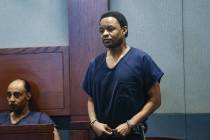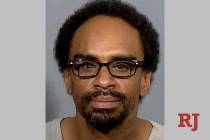Las Vegas police to begin publicly releasing details of non-fatal shootings
The Metropolitan Police Department today is unveiling changes to its Use of Force Review Board that it hopes will re-establish credibility with the public and broaden the scope of a panel that has been criticized as a rubber stamp in officer-involved shootings.
In the past, the department's Use of Force Board determined whether a shooting was "justified" or "unjustified." Recently the department changed the classifications to "administrative approval" and "administrative disapproval." The changes are aimed at examining the totality of the officer's actions rather than simply issuing a blanket approval or a rare disapproval.
The department also will release more internal documents on officer-involved shootings, beginning with a March SWAT standoff involving a man who ultimately committed suicide.
Senior officers briefed the Review-Journal on the policy changes Tuesday.
The changes come in the wake of a federal review of the department's use-of-force polices. That review included the department's much-maligned Use of Force Board, which was found to lack accountability and transparency in rarely finding fault with officers.
Assistant Sheriff Ted Moody said the board, a panel of four civilians and three officers who determine whether an officer's actions violated department policy, had in the past taken a very narrow view of police shootings.
"There was no intent (before) to have the board look at circumstances that developed before or after force was applied," Moody said.
He said that didn't give board members enough flexibility to review actions that led to the shooting. Even if the board questioned the preceding events, they were unable to comment, he said.
"There was no way for the board to rule against (an officer) without ruling the whole (shooting) not justified"
The modifications were implemented in June when Sheriff Doug Gillespie appointed Moody, who oversees patrol officers, as nonvoting chairman of the board. Previously the deputy chief of detectives had led the panel.
But the changes weren't announced for six months as the department awaited results of the U.S. Department of Justice study of the agency, which, completed last month, called the panel "police friendly."
Officials from the Justice Department's Office of Community Oriented Policing Services sat in on six Use of Force Review Boards, four after the changes were implemented.
"They've got a good sense of where it came from, where it is today and where it will probably go in the future," Moody said.
The department began releasing its force reports of fatal shootings in June, but details of nonfatal shootings were rarely disclosed until today.
Sgt. Kelly McMahill, who has spent the previous 10 months in the department's Office of Internal Oversight working with federal investigators, said even the Clark County coroner's office didn't divulge this type of information.
"Inquests only dealt with fatal shootings," McMahill said. "Historically, I just don't think we've let the public know much about these incidents. And we're attempting to change this."
Findings in all six nonfatal shootings this year will be released as the criminal cases are concluded, McMahill said. Most of the people who survive their shootings are charged with crimes.
Today's case will detail the March shooting involving Sammie Lee Clay, 56, who shot a police officer after a domestic incident at his home.
There is no criminal case against Clay because he committed suicide after a standoff with SWAT, McMahill said.
Of the many officers involved in that incident, at least one's actions was ruled "administrative disapproval," Moody said. Other officers' tactics were questioned, he said.
Any finding of wrongdoing is a stark change from past Use of Force Review Boards. A Review-Journal investigation last year showed that the panel was inherently skewed in favor of the officer, and it cleared officers 99 percent of the time over a 10-year span.
Moody said changes to the board are not completed. The department's biggest goal was to establish credibility with the community, he said. That means finding an educated and diverse group of civilians to sit on the board, he said.
McMahill said she hopes the public will recognize the department's concerted effort to be progressive. The sheriff didn't wait for the Justice Department's findings before making changes to the board, she said. "I think it's important to note that we didn't wait."
Contact reporter Mike Blasky at mblasky@reviewjournal.com or 702-383-0283.























